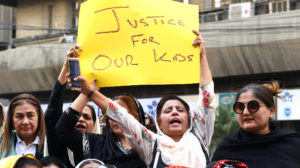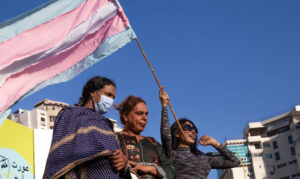Why is Joyland being promoted as a “trans love story”? Since its release, the first Pakistani movie to ever be screened at the Cannes Film Festival has been making headlines in the West, where progressives celebrate it for bringing the country’s transgender community into the spotlight. But that interpretation is not only reductive — it is also harmful to the minorities these commentators claim to be supporting.
While one of the stars of Joyland is a trans actor, whose character has a budding romantic relationship, focusing on this aspect of the movie misses the larger themes its creators were looking to highlight: the soul-crushing demands made of women in Pakistan — particularly mothers — and the tragic choices some make to escape their desolate circumstances. Questions of masculinity, familial responsibility, and the struggles of working-class Pakistani families are all presented with care and nuance, as is the discrimination faced by transgender people. The latter, though, is not the crux of the story.
One wouldn’t describe John Wick as a movie about animal cruelty, or Jurassic Park as a tale of corporate negligence, even though those themes are present. But amplifying LGBT-related content in movies has recently become a trend in the West — partly fuelled by a marketing industry that has wholeheartedly adopted identity politics as a way to sell cinema tickets. It is, of course, encouraging that LGBT minorities in Western societies are increasingly accepted and visible in popular culture. But in nations where they are not, exaggerating their centrality to a storyline can spell disaster for struggling artists who are treading a line, carefully weaving overlooked narratives into their works.
Last August, Pakistan’s censor boards approved Joyland for release, but backtracked after receiving complaints from religious politicians that the film “contains highly objectionable material which do not conform with the social values and moral standards of our society”. It was banned until November, but was cleared for release after a government committee was set up to investigate the film. The hard work of local journalists, and a social media campaign in Pakistan with the hashtag #ReleaseJoyland, helped reverse the ban, and the film has enjoyed a successful run in cinemas. Still, the more sexual elements of the movie were censored for domestic audiences, and it is not being screened in the nation’s most populous province of Punjab.
In all this, Western discourse has probably been more of a hindrance than a help. Pakistan’s traditionalist circles tend to be biased against anything given the stamp of approval by Western progressives. Maria Butt, for instance, one of the nation’s most influential and successful fashion designers, has vehemently spoken out against the promotion and screening of Joyland in Pakistan, accusing it of promoting a “trans agenda”. Given that she supports boycotting the film, we can safely assume that she hasn’t actually watched it. But her response is still useful, in that it reveals what happens when Western ideology is imposed on works of art set in more socially conservative nations. Here, the labels of “trans” and “LGBT” can easily discourage a local audience from engaging with a work’s more subtle themes, potentially prejudicing moviegoers before they’ve had a chance to watch it.
The implications of this are profound. It’s not a big deal for Disney if Thor: Love and Thunder is blocked for release in Malaysia due to its blink-and-you-miss-it allusions to bisexuality. But for indie production companies such as Khoosat Films — creators of Joyland — local audiences being put off their work can prevent a project breaking even, as well as discourage up-and-coming directors from pursuing more risqué stories. Filmmakers in Pakistan know this, which is why Joyland’s official trailers don’t mention the Queer Palm awarded to the film, instead only highlighting its Jury Prize at Cannes. (News of the award still made its way to Pakistan, with one politician responding: “Obviously if it’s received the Queer Palm award what kind of film must it be?”)
But where reviews in the West consistently describe the film as a “trans-cis” love story or a “trans drama”, Pakistani viewers rarely single out this plot point, focussing instead on its more universally accessible themes of loneliness and despair. Meanwhile, not all films with LGBT characters are met with condemnation in Pakistan. In 2019, Joyland’s director, Saim Sadiq, and trans star, Alina Khan, worked together on Darling. It’s possible that Sadiq was testing the waters with this 16-minute short film, which follows Khan as she tries to make it as an erotic dancer in Lahore, but faces pushback and discrimination. It was the first Pakistani film to be screened at Venice Film Festival and won the award for Best Short Film, but otherwise received little attention in the West. In Pakistan, however, it was heralded as a “landmark moment for queer cinema”.
The myopia of Western critics also ignores some of Joyland‘s more tragic themes, which involve its non-trans female characters: the pressure to produce a male heir; the discouragement to pursue meaningful work outside the domestic realm; the feeling of powerlessness as the men in your life are free to explore and “find themselves”, sexually or otherwise. The despondency and desperation that millions of Pakistani women experience in their daily lives is not relatable for the average North American or European moviegoer. What Western audiences are well-acquainted with, however, is the claim that transgender people face discrimination in society. And as a result, the film’s layered exposés of Pakistani society are reduced to the latest progressive cause: trans activism. The mistreatment of women in Pakistan, meanwhile, is largely glossed over.
This is part of a wider and worrying cultural trend. Last month, I wrote about how Pakistan’s annual International Women’s Day march, due to take place in Lahore today, had been hijacked by causes more palatable to Western progressives. The Aurat March organisers’ foregrounding of trans issues made it more controversial in its country of origin, to the point where, over the weekend, it was banned. Here, surely, is a sign that those seeking change in Pakistan must reach out to social conservatives — the nation is home to so many, both male and female — or face being outlawed. It may be unfortunate that some of the LGBT lifestyles presented by the Western media would be viewed as scandalous to the average Pakistani, but that is the reality. Pushing a unipolar idea of what “progress” looks like won’t remedy this. What’s needed are films such as Joyland — films which are doing the hard work of trying to change hearts and minds by presenting subtle, nuanced stories that encourage the viewer to come to a different understanding of what it means to be gay or transgender.
Despite the negative press and attempts at censorship, Joyland has received enormous support from Pakistanis who recognise how necessary the film is, not just for the country’s struggling movie industry, but also for its social culture. It deftly handles domestic challenges that devastate the lives of far too many in the country — men, women and transgender people. It’s a movie by Pakistanis for Pakistanis that reflects back to us a more complete representation of our society than we’re used to seeing on screen. By the time the credits roll, your heart swells — and, when viewed as its creators intended, it doesn’t occur to you that what you’ve just watched is an award-winning “trans romance”.
Disclaimer
Some of the posts we share are controversial and we do not necessarily agree with them in the whole extend. Sometimes we agree with the content or part of it but we do not agree with the narration or language. Nevertheless we find them somehow interesting, valuable and/or informative or we share them, because we strongly believe in freedom of speech, free press and journalism. We strongly encourage you to have a critical approach to all the content, do your own research and analysis to build your own opinion.
We would be glad to have your feedback.
Source: UnHerd Read the original article here: https://unherd.com/



